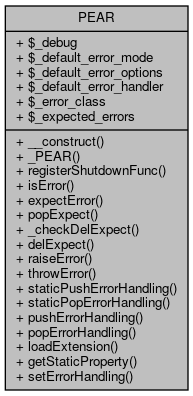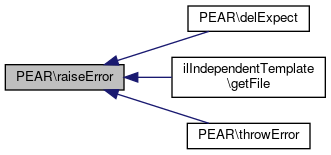 Inheritance diagram for PEAR:
Inheritance diagram for PEAR: Collaboration diagram for PEAR:
Collaboration diagram for PEAR:Public Member Functions | |
| __construct ($error_class=null) | |
| Constructor. More... | |
| _PEAR () | |
| Destructor (the emulated type of...). More... | |
| registerShutdownFunc ($func, $args=array()) | |
| Use this function to register a shutdown method for static classes. More... | |
| isError ($data, $code=null) | |
| Tell whether a value is a PEAR error. More... | |
| expectError ($code=' *') | |
| This method is used to tell which errors you expect to get. More... | |
| popExpect () | |
| This method pops one element off the expected error codes stack. More... | |
| _checkDelExpect ($error_code) | |
| This method checks unsets an error code if available. More... | |
| delExpect ($error_code) | |
| This method deletes all occurences of the specified element from the expected error codes stack. More... | |
| & | raiseError ($message=null, $code=null, $mode=null, $options=null, $userinfo=null, $error_class=null, $skipmsg=false) |
| This method is a wrapper that returns an instance of the configured error class with this object's default error handling applied. More... | |
| & | throwError ($message=null, $code=null, $userinfo=null) |
| Simpler form of raiseError with fewer options. More... | |
| staticPushErrorHandling ($mode, $options=null) | |
| staticPopErrorHandling () | |
| pushErrorHandling ($mode, $options=null) | |
| Push a new error handler on top of the error handler options stack. More... | |
| popErrorHandling () | |
| Pop the last error handler used. More... | |
| loadExtension ($ext) | |
| OS independant PHP extension load. More... | |
Static Public Member Functions | |
| static & | getStaticProperty ($class, $var) |
| If you have a class that's mostly/entirely static, and you need static properties, you can use this method to simulate them. More... | |
| static | setErrorHandling ($mode=null, $options=null) |
| Sets how errors generated by this object should be handled. More... | |
Data Fields | |
| $_debug = false | |
| $_default_error_mode = null | |
| $_default_error_options = null | |
| $_default_error_handler = '' | |
| $_error_class = 'PEAR_Error' | |
| $_expected_errors = array() | |
Detailed Description
Constructor & Destructor Documentation
◆ __construct()
| PEAR::__construct | ( | $error_class = null | ) |
Constructor.
Registers this object in $_PEAR_destructor_object_list for destructor emulation if a destructor object exists.
- Parameters
-
string $error_class (optional) which class to use for error objects, defaults to PEAR_Error. @access public
- Returns
- void
Reimplemented in ilAdvancedMDRecordParser, ilManifestParser, ilSimpleXMLTableDataParser, ilSoapMailXmlParser, ilXMLResultSetParser, ilMDSaxParser, ilMDSaxParser, ilMDSaxParser, ilCopyWizardSettingsXMLParser, and ilAssQuestionSkillAssignmentXmlParser.
Definition at line 170 of file PEAR.php.
Member Function Documentation
◆ _checkDelExpect()
| PEAR::_checkDelExpect | ( | $error_code | ) |
This method checks unsets an error code if available.
- Parameters
-
mixed error code
- Returns
- bool true if the error code was unset, false otherwise @access private
- Since
- PHP 4.3.0
Definition at line 423 of file PEAR.php.
References $key.
Referenced by delExpect().
 Here is the caller graph for this function:
Here is the caller graph for this function:◆ _PEAR()
| PEAR::_PEAR | ( | ) |
Destructor (the emulated type of...).
Does nothing right now, but is included for forward compatibility, so subclass destructors should always call it.
See the note in the class desciption about output from destructors.
@access public
- Returns
- void
Definition at line 209 of file PEAR.php.
◆ delExpect()
| PEAR::delExpect | ( | $error_code | ) |
This method deletes all occurences of the specified element from the expected error codes stack.
- Parameters
-
mixed $error_code error code that should be deleted
- Returns
- mixed list of error codes that were deleted or error @access public
- Since
- PHP 4.3.0
Definition at line 453 of file PEAR.php.
References $key, _checkDelExpect(), and raiseError().
 Here is the call graph for this function:
Here is the call graph for this function:◆ expectError()
| PEAR::expectError | ( | $code = '*' | ) |
This method is used to tell which errors you expect to get.
Expected errors are always returned with error mode PEAR_ERROR_RETURN. Expected error codes are stored in a stack, and this method pushes a new element onto it. The list of expected errors are in effect until they are popped off the stack with the popExpect() method.
Note that this method can not be called statically
- Parameters
-
mixed $code a single error code or an array of error codes to expect
- Returns
- int the new depth of the "expected errors" stack @access public
Definition at line 388 of file PEAR.php.
References $_expected_errors, and $code.
◆ getStaticProperty()
|
static |
If you have a class that's mostly/entirely static, and you need static properties, you can use this method to simulate them.
Eg. in your method(s) do this: $myVar = &PEAR::getStaticProperty('myclass', 'myVar'); You MUST use a reference, or they will not persist!
@access public
- Parameters
-
string $class The calling classname, to prevent clashes string $var The variable to retrieve.
- Returns
- mixed A reference to the variable. If not set it will be auto initialised to NULL.
Definition at line 231 of file PEAR.php.
Referenced by PEAR_Error\__construct(), and _PEAR_call_destructors().
 Here is the caller graph for this function:
Here is the caller graph for this function:◆ isError()
| PEAR::isError | ( | $data, | |
$code = null |
|||
| ) |
Tell whether a value is a PEAR error.
- Parameters
-
mixed $data the value to test int $code if $data is an error object, return true only if $code is a string and $obj->getMessage() == $code or $code is an integer and $obj->getCode() == $code @access public
- Returns
- bool true if parameter is an error
Definition at line 280 of file PEAR.php.
◆ loadExtension()
| PEAR::loadExtension | ( | $ext | ) |
OS independant PHP extension load.
Remember to take care on the correct extension name for case sensitive OSes.
- Parameters
-
string $ext The extension name
- Returns
- bool Success or not on the dl() call
Definition at line 749 of file PEAR.php.
◆ popErrorHandling()
| PEAR::popErrorHandling | ( | ) |
Pop the last error handler used.
- Returns
- bool Always true
- See also
- PEAR::pushErrorHandling
Definition at line 725 of file PEAR.php.
References $GLOBALS, PHPMailer\PHPMailer\$options, and setErrorHandling().
 Here is the call graph for this function:
Here is the call graph for this function:◆ popExpect()
| PEAR::popExpect | ( | ) |
◆ pushErrorHandling()
| PEAR::pushErrorHandling | ( | $mode, | |
$options = null |
|||
| ) |
Push a new error handler on top of the error handler options stack.
With this you can easily override the actual error handler for some code and restore it later with popErrorHandling.
- Parameters
-
mixed $mode (same as setErrorHandling) mixed $options (same as setErrorHandling)
- Returns
- bool Always true
- See also
- PEAR::setErrorHandling
Definition at line 694 of file PEAR.php.
References $_default_error_mode, $_default_error_options, $GLOBALS, PHPMailer\PHPMailer\$options, and setErrorHandling().
 Here is the call graph for this function:
Here is the call graph for this function:◆ raiseError()
| & PEAR::raiseError | ( | $message = null, |
|
$code = null, |
|||
$mode = null, |
|||
$options = null, |
|||
$userinfo = null, |
|||
$error_class = null, |
|||
$skipmsg = false |
|||
| ) |
This method is a wrapper that returns an instance of the configured error class with this object's default error handling applied.
If the $mode and $options parameters are not specified, the object's defaults are used.
- Parameters
-
mixed $message a text error message or a PEAR error object int $code a numeric error code (it is up to your class to define these if you want to use codes) int $mode One of PEAR_ERROR_RETURN, PEAR_ERROR_PRINT, PEAR_ERROR_TRIGGER, PEAR_ERROR_DIE, PEAR_ERROR_CALLBACK, PEAR_ERROR_EXCEPTION. mixed $options If $mode is PEAR_ERROR_TRIGGER, this parameter specifies the PHP-internal error level (one of E_USER_NOTICE, E_USER_WARNING or E_USER_ERROR). If $mode is PEAR_ERROR_CALLBACK, this parameter specifies the callback function or method. In other error modes this parameter is ignored. string $userinfo If you need to pass along for example debug information, this parameter is meant for that. string $error_class The returned error object will be instantiated from this class, if specified. bool $skipmsg If true, raiseError will only pass error codes, the error message parameter will be dropped.
@access public
- Returns
- object a PEAR error object
- See also
- PEAR::setErrorHandling
- Since
- PHP 4.0.5
Definition at line 522 of file PEAR.php.
References $_default_error_mode, $_default_error_options, $_error_class, $code, $GLOBALS, $message, PHPMailer\PHPMailer\$options, and PEAR_ERROR_RETURN.
Referenced by delExpect(), ilIndependentTemplate\getFile(), and throwError().
 Here is the caller graph for this function:
Here is the caller graph for this function:◆ registerShutdownFunc()
| PEAR::registerShutdownFunc | ( | $func, | |
$args = array() |
|||
| ) |
Use this function to register a shutdown method for static classes.
@access public
- Parameters
-
mixed $func The function name (or array of class/method) to call mixed $args The arguments to pass to the function
- Returns
- void
Definition at line 255 of file PEAR.php.
References $GLOBALS.
◆ setErrorHandling()
|
static |
Sets how errors generated by this object should be handled.
Can be invoked both in objects and statically. If called statically, setErrorHandling sets the default behaviour for all PEAR objects. If called in an object, setErrorHandling sets the default behaviour for that object.
- Parameters
-
int $mode One of PEAR_ERROR_RETURN, PEAR_ERROR_PRINT, PEAR_ERROR_TRIGGER, PEAR_ERROR_DIE, PEAR_ERROR_CALLBACK or PEAR_ERROR_EXCEPTION. mixed $options When $mode is PEAR_ERROR_TRIGGER, this is the error level (one of E_USER_NOTICE, E_USER_WARNING or E_USER_ERROR).
When $mode is PEAR_ERROR_CALLBACK, this parameter is expected to be the callback function or method. A callback function is a string with the name of the function, a callback method is an array of two elements: the element at index 0 is the object, and the element at index 1 is the name of the method to call in the object.
When $mode is PEAR_ERROR_PRINT or PEAR_ERROR_DIE, this is a printf format string used when printing the error message.
@access public
- Returns
- void
- See also
- PEAR_ERROR_RETURN
- PEAR_ERROR_PRINT
- PEAR_ERROR_TRIGGER
- PEAR_ERROR_DIE
- PEAR_ERROR_CALLBACK
- PEAR_ERROR_EXCEPTION
- Since
- PHP 4.0.5
Definition at line 337 of file PEAR.php.
References $GLOBALS, PHPMailer\PHPMailer\$options, PEAR_ERROR_CALLBACK, PEAR_ERROR_DIE, PEAR_ERROR_EXCEPTION, PEAR_ERROR_PRINT, PEAR_ERROR_RETURN, and PEAR_ERROR_TRIGGER.
Referenced by popErrorHandling(), and pushErrorHandling().
 Here is the caller graph for this function:
Here is the caller graph for this function:◆ staticPopErrorHandling()
| PEAR::staticPopErrorHandling | ( | ) |
Definition at line 644 of file PEAR.php.
References $GLOBALS, PHPMailer\PHPMailer\$options, PEAR_ERROR_CALLBACK, PEAR_ERROR_DIE, PEAR_ERROR_EXCEPTION, PEAR_ERROR_PRINT, PEAR_ERROR_RETURN, and PEAR_ERROR_TRIGGER.
◆ staticPushErrorHandling()
| PEAR::staticPushErrorHandling | ( | $mode, | |
$options = null |
|||
| ) |
Definition at line 609 of file PEAR.php.
References $GLOBALS, PHPMailer\PHPMailer\$options, PEAR_ERROR_CALLBACK, PEAR_ERROR_DIE, PEAR_ERROR_EXCEPTION, PEAR_ERROR_PRINT, PEAR_ERROR_RETURN, and PEAR_ERROR_TRIGGER.
◆ throwError()
| & PEAR::throwError | ( | $message = null, |
|
$code = null, |
|||
$userinfo = null |
|||
| ) |
Simpler form of raiseError with fewer options.
In most cases message, code and userinfo are enough.
- Parameters
-
string $message
Definition at line 595 of file PEAR.php.
References $code, $message, and raiseError().
 Here is the call graph for this function:
Here is the call graph for this function:Field Documentation
◆ $_debug
◆ $_default_error_handler
◆ $_default_error_mode
| PEAR::$_default_error_mode = null |
Definition at line 120 of file PEAR.php.
Referenced by pushErrorHandling(), and raiseError().
◆ $_default_error_options
| PEAR::$_default_error_options = null |
Definition at line 129 of file PEAR.php.
Referenced by pushErrorHandling(), and raiseError().
◆ $_error_class
| PEAR::$_error_class = 'PEAR_Error' |
Definition at line 146 of file PEAR.php.
Referenced by raiseError().
◆ $_expected_errors
| PEAR::$_expected_errors = array() |
Definition at line 154 of file PEAR.php.
Referenced by expectError().
The documentation for this class was generated from the following file:
- libs/ilias/Init/PEAR/PEAR.php










